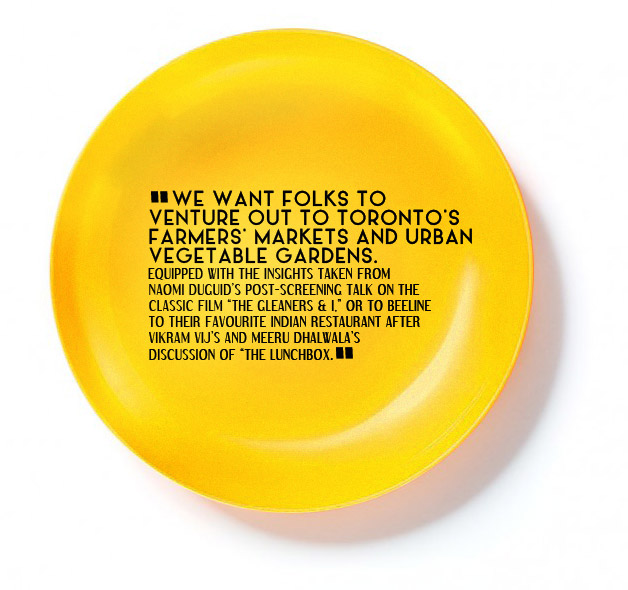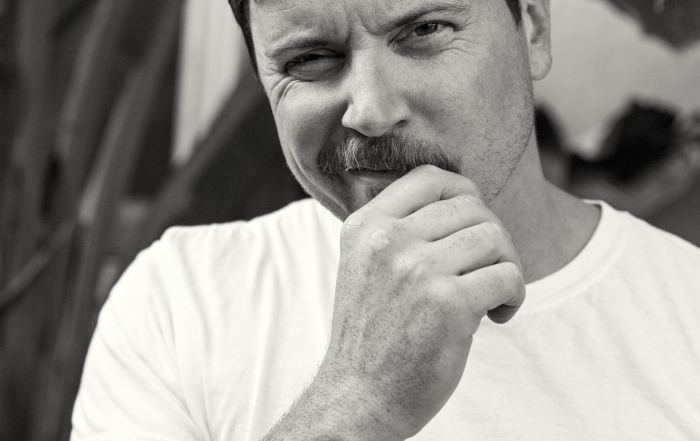
Between the Food Network, “Elite” Yelpers and LUCKY PEACH journal, it’s safe to say that the culinary arts currently hover in and around movies and sports, when ranking the public’s pastimes of choice. And, like the actors and athletes that corral throngs of global fans, contemporary chefs, now too, wield a celebrity status mighty enough to command mass international attention. From mouth-watering social media feeds to television series upon television series, these captains of the kitchen permeate pop culture.
Today’s “foodie” phenomenon, though, does not mark the beginning of the film medium’s fascination with delicious chow. In fact, since the invention of the moving picture—dating back to the Lumière brothers’ Le Repas de Bébé (Baby’s Dinner) in 1895—mealtime has sparked the creative fancy of many a director.
In honour of this long tradition, and newly invigorated film niche, TIFF hosts its 4th annual “Food on Film” series. Curated with hungry cinephiles in mind, this year’s lineup caters to a variety of tastes, with films ranging from festival gems such as The Lunchbox (2013), documentaries including A Place at the Table (2012) and unexpected cult classics the likes of Meatballs (1979). For dessert, viewers are invited to stay for a helping of insider knowledge, courtesy of chefs, restaurateurs and food experts.
With a list of guest speakers that boasts names ranging from Naomi Duguid, the culinary anthropologist and James Bear Award-winning travel writer to Chad Robertson of San Francisco’s Tartine Bakery & Café—a man heralded as American’s best bread maker—post-screening discussions promise to satiate even the most ravenous of cravings for shop talk.
“A series like ‘Food on Film’ is accessible and open to anyone curious about learning how film connects with the culinary arts, and more broadly, the food industry. We love the idea of bringing foodies and cinephiles together under one roof, watching films and joining the conversation with our expert guests,” says Theresa Scandiffio, Director of Adult Learning for TIFF. “We want folks to venture out to Toronto’s farmers’ markets and urban vegetable gardens, equipped with the insights taken from Naomi Duguid’s post-screening talk on the classic film The Gleaners & I, or to beeline to their favourite Indian restaurant after Vikram Vij’s and Meeru Dhalwala’s discussion of The Lunchbox.”
And then, there are those evenings when the audience’s call to action is not so obvious. Such was the case last Wednesday, at the fourth installment of the series, where the post-screening craving for us, ended up being as delightfully atypical as both the evening’s guest of honour, chef Wylie Dufresne, and his film of choice, Delicatessen (1991). The hankering? Simple food with a side of sports.
Now, this is not the urge one imagines the match between a César Award-winning French art house film and a James Beard Award-winning chef to induce, but such is the point. Unexpected enlightenment is part of the series’ accoutrement. “There’s a real kinship,” says Dufresne of chefs and athletes, going on to explain how his own culinary career—one renowned for enticing experiments in molecular gastronomy at New York restaurants, wd~50 (now closed) and Alder—stems, in part, from a love of sport. “The overlap was incredible for me, and I fell in love with it instantly.” Don’t see it? Simply think about the “sheer physical nature of cooking,” as the chef puts it, to spot the connection.
As for the kinship between the chef and Delicatessen, the parallel presents itself as a perfect combination of unabashed quirks and surreal creative genius. In the chef’s case, Scandiffio describes this pairing as an “ability to fuse food science with unbelievable flavours and beautiful artistry,” culminating in “awe-inspiring” dishes. Similarly, Delicatessen—a black comedy from directors Marc Caro and Jean-Pierre Jeunet—couples the unbelievable with the beautiful, as it serves up post-apocalyptic horrors…plus one spoonful of sugar. The result is what Dufresne calls a “lighthearted and zany” film; one fans of Amélie—Jeunet’s breakout foreign language hit from 2001—will especially appreciate for its distinct candied pleasantries.

Though Delicatessen is not exactly a movie about food (unless one counts cannibalism as an extreme style of nose-to-tail cuisine), the film’s origins do conjure up culinary capitals by way of France, while the sheer necessity placed on sustenance in the plot, keeps food and cooking steadily on the mind. “If you look between the lines, you can see the love of food,” said Dufresne to Wednesday’s audience.
Given the chef’s aforementioned penchant for sports, it was a happy coincidence that we should invite, Matthew Sullivan, Executive Chef of Real Sports in Toronto (formerly of Skin + Bones), to attend the series with us. At the helm of a restaurant that fills just under a 1000 seats (playoff season or not), Sullivan knows precisely what Dufresne is referring to, when speaking about the “physical nature” of life behind the stove. For further proof, see Sullivan’s champion showing on Season 2 of Chopped Canada or grab a seat at his roving dinner series Boxed, where diners stand witness to MacGyver-esque cookery—culinary athleticism guaranteed.
To accompany Sullivan, we invited local food writer, Jon Sufrin. Former Online Editor at Post City magazines and a regular contributor to Toronto Life and The Globe and Mail, Sufrin’s culinary curiosity leans towards the unexpected (think: Spam, MSG and durian milkshakes), ensuring he be a captive audience for both Delicatessen and Dufresne.
And so, with French Cinema, food and, let’s not forget sports, on the mind, we made a post-screening trek to e11even—sister restaurant to Real Sports—for meatballs, an NHL playoff game and a surreal discussion about Delicatessen and its characters’ drastic survival strategies. (Warning: Contains explicit nightmarish humour. Reader discretion advised.)

FILLER: Let’s start by talking about chef Dufresne’s choice in film; what did you think of it?
Jon Sufrin (JS): Well, I thought he picked a fucking awesome movie. It’s the type of movie I want to watch multiple times because I feel like there are little details that I missed, that…if I understood them, would be great. But, it wasn’t really a food movie…
Matthew Sullivan (MS): No, you’re right about that.
JS: I liked how you could sympathize with the main villain; he had people to feed.
MS: Yeah, what did the guy say…not everyone is entirely evil, it’s just circumstance.
NEXT >>














